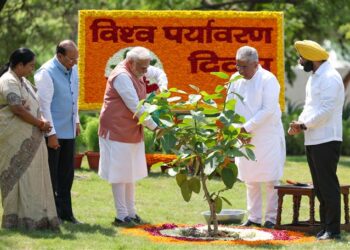According to a statement released by the Law Ministry on April 5 (Saturday), President Droupadi Murmu approved the Waqf (Amendment) Bill, 2025. The Bill was recently cleared by the Parliament after intense and lengthy debates in both the Lok Sabha and Rajya Sabha.
AIMIM (All India Majlis-e-Ittehadul Muslimeen) president Asaduddin Owaisi and Congress Parliamentarian Mohammad Javed have challenged the validity of the historic legislation in the Supreme Court, sparking a flurry of debate.
However, the government has categorically denied claims that the modified law infringes upon Muslims’ religious freedom.
Home Minister Amit Shah clarified the main points of the Act in a forceful statement made during the Lok Sabha session.
He emphasized that the Muslim community is fundamentally anchored in waqf, a sacred charity endowment, and the waqif, or donor.
He explained that non-Muslims are only included in Waqf Boards or Councils for administrative reasons, guaranteeing that each waqf donation is used for its “intended noble” purpose.
“There is a purposeful attempt to sow confusion, suggesting that this law encroaches upon religious practices or alters the sanctity of donations,” HM Shah stated, allaying anxieties and addressing concerns.
The Union Home Minister said that such baseless fear-mongering, is a “calculated ploy” to manipulate public sentiment and “create a vote bank”.
He further distinguished between the spiritual sanctity of Waqf and the administrative nature of Waqf Boards, asserting: “Waqf, as a charitable endowment,” remains a religious institution. However, Waqf Boards and Councils are administrative entities, “devoid of religious connotations”.
According to the Union Minister, this legislation, despite igniting a heated discussion, demonstrates the government’s commitment to respecting constitutional values while guaranteeing accountability and openness in the management of charity endowments.
He had explained that it represents a critical juncture in the country’s legislative history, demonstrating a careful balancing act between tradition and contemporary administration.
The Waqf (Amendment) Bill, 2025 was approved by the Parliament early on Friday, April 4, following a long and intense discussion in the Rajya Sabha. The Bill was approved in the Upper House by a majority of 128 votes against 95, just one day after it was passed in the Lok Sabha after an almost 12-hour-long debate.
In the Lower House of Parliament, Union Home Minister Amit Shah and Parliamentary Affairs Minister Kiren Rijiju had argued persuasively for the Waqf (Amendment) Bill, while in the Upper House, Union Minister J.P. Nadda and the Leader of the Rajya Sabha led an intense discussion on the Bill while denouncing the opposition.
On Friday, the majority of members voted in favor of the Bill, capping the debate that started on Thursday, April 3.
In his criticism of the Congress’s handling of the Waqf Act, J.P. Nadda claimed that the grand old party had passed the legislation in a way that reportedly made it easier for land mafias to operate.
Spotlighting the national importance of the issue and the need for in-depth deliberation, J.P. Nadda drew attention to the formation of a Joint Parliamentary Committee (JPC) under the Prime Minister Narendra Modi-led government.
Comprising 31 members, the committee has facilitated over 200 hours of debate on the bill.
This, he pointed out, stands in stark contrast to the JPC setup during the UPA government in 2013, which had only 13 members and lacked the same level of commitment.
J.P. Nadda asserted that democracy thrives on meaningful discourse and the inclusion of diverse perspectives, rather than simply accepting a single viewpoint.
Highlighting the importance of the Bill on a national level and the need for concentrated discussion, the Rajya Sabha leader emphasized the establishment of a Joint Parliamentary Committee (JPC) under the PM Modi-led administration. The JPC had 31 members and conducted a 200-hour debate on the Bill.
Compared to the JPC formed in 2013 during the UPA government, which had only 13 members and lacked the same level of dedication, he said this was a significant improvement.
He emphasized that rational discussion and the inclusion of other points of view, as opposed to only accepting one, are what democracy depends on.
Source: IANS







 Finance
Finance







